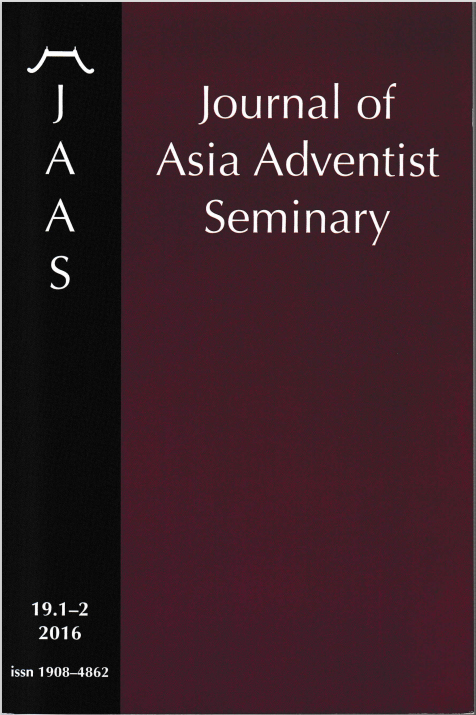Editorial
Abstract
Welcome to a new issue of JAAS. After decades and centuries of commentaries written on Paul and his theology and practice, what else could be added? All of Paul’s letters have been decoded and clarified, and most of the theological debates settled. However, the pastoral theology of the great apostle, posed against the rediscovered natural socio-cultural contexts, continues to elicit further study. Kendra Haloviak Valentine digs deep into the text and context of the first Letter to the Corinthians in order to understand the meaning of Paul’s references to unworthy worship. She not only explains the urban context of Corinth but also gathers information about house churches and meals related to worship. She also looks at how the ugly Corinthian caste and class culture shaped the local ekklesia. Was Paul justified for being upset? How did he handle cultural issues of shame and honor, power, privilege, and status so prevalent in the Mediterranean culture? Is a pastor theologian supposed to level social differences? I encourage you to read Kendra Haloviak Valentine’s article to discover how inclusion rather than exclusion makes worship and its related meals worthy.
Addressing another aspect of Pauline theology, Ron du Preez delves into an exegetical and comparative study of the term sabbata in Col 2:16. Looking at the different textual clues and comparing instances where the apostle talks about moral and ceremonial issues, du Preez analyzes how Seventh-day Adventists understood and stated their positions in official documents. Comparing the typological approach with the linguistic and contextual ones, the author looks at key terms and chiastic structures that help the interested reader grasp the right meaning of sabbata in different contexts. Inter-textual and calendar references complete du Preez’s in-depth analysis of the term in Col 2:16, concluding that Paul is addressing a ceremonial rather than a moral issue in this debated passage.
The third article in this journal tries to clarify God and Israel’s involvement in the destruction of the Canaanites. Many people have a moral dilemma in accepting that God killed males, females, and children indiscriminately and question God’s character in the OT. Carlos Mora and Felix Gos-sal explore the meanings of “holy war” (jihad) and of “Canaanite genocide” terminologies. They place their analysis in the larger context of God’s balanced character that includes justice and mercy as well as against the framework of the cosmic conflict between good and evil. The authors’ desire for logical consistency in understanding God and biblical wars is welcome in a world that reacts emotionally when faced with tragedy and genocide.
Remwil Tornalejo explores the writings of Ellen G. White, one of the co-founders of the Seventh-day Adventist Church, in order to find guidance regarding political involvement. He is offering an overview of her advice about running for office and voting. Adventists are known for upholding the separation between church and government, between religion and state. Tornalejo’s article places the right to vote and running for office references against the implications of church and state separation. Politics involvement with religion (and viceversa) is increasingly a hot topic, regardless of the geographical location or religion involved. Eschatology and prophecy create a context in which different positions about political involvement run in tension with each other. Should we vote, and for whom? Remwil Tornalejo seems to have found an answer to this dilemma.
Gabriel Masfa draws attention to the impact of colonialism on Seventh-day Adventist mission in Africa. As a historian, he looks at the different periods that were marked by a growing dynamics of colonialism, in spite of the Seventh-day Adventist Church being known as supporting the abolitionist movement in the United States. Masfa introduces the context in which Africans perceived Christian missionaries in general, and Adventist missionaries in particular, as mercenaries who came to subjugate them. He reminds the readers that Adventists played along with the Apartheid politics in South Africa and distributed their missionary work based on Euro-pean colonial occupation. Masfa shows how missionaries changed assigned fields based on changing colonial powers that temporarily controlled certain territories. He also shows how missionaries had to confront racism, African Traditional Religions, and advancing Islam. Gabriel Masfa assesses both the positive and the negative sides of colonial mission in Africa. This is the first in a series of articles on the history of Adventism in Africa.
I would like to thank Michael W. Campbell and Eike Mueller, the previous editor and associate editor of JAAS, for their excellent work and contribution to the journal. I would also like to introduce to you our new team: associate editors Diana Răzmeriţă, an OT scholar who comes from Moldova; Olaotse Gabasiane, originally from Botswana, who specializes in Mission and Ministry; Adrian Petre, the assistant/book review editor from Romania; Lalrokima Fanai, the layout editor from India; Sheri Namanya, our Seminary editor, and Ivy Ambat, the managing editor, from the Phili-pines. Mabuhay!

